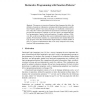Free Online Productivity Tools
i2Speak
i2Symbol
i2OCR
iTex2Img
iWeb2Print
iWeb2Shot
i2Type
iPdf2Split
iPdf2Merge
i2Bopomofo
i2Arabic
i2Style
i2Image
i2PDF
iLatex2Rtf
Sci2ools
140
click to vote
LOPSTR
2005
Springer
2005
Springer
Declarative Programming with Function Patterns
We propose an extension of functional logic languages that allows the definition of operations with patterns containing other defined operation symbols. Such “function patterns” have many advantages over traditional constructor patterns. They allow a direct representation of specifications as declarative programs, provide better abstractions of patterns as first-class objects, and support the highlevel programming of queries and transformation of complex structures. Moreover, they avoid known problems that occur in traditional programs using strict equality. We define their semantics via a transformation into standard functional logic programs. Since this transformation might introduce an infinite number of rules, we suggest an implementation that can be easily integrated with existing functional logic programming systems. 1 Motivation Functional logic languages (see [16] for a survey) integrate the most important features of functional and logic languages to provide a variet...
Related Content
| Added | 28 Jun 2010 |
| Updated | 28 Jun 2010 |
| Type | Conference |
| Year | 2005 |
| Where | LOPSTR |
| Authors | Sergio Antoy, Michael Hanus |
Comments (0)

